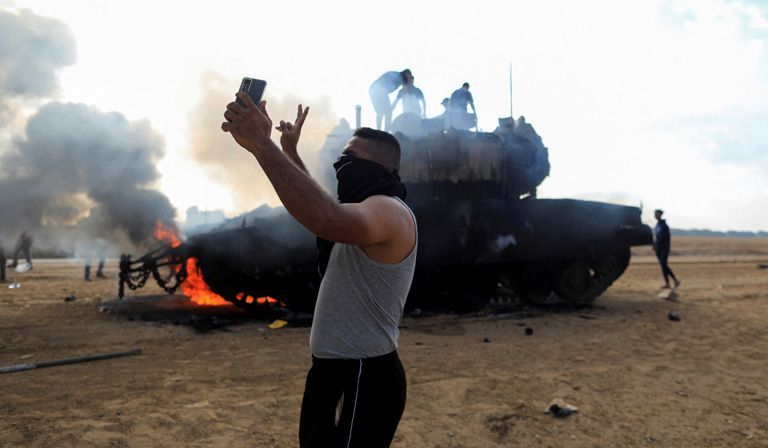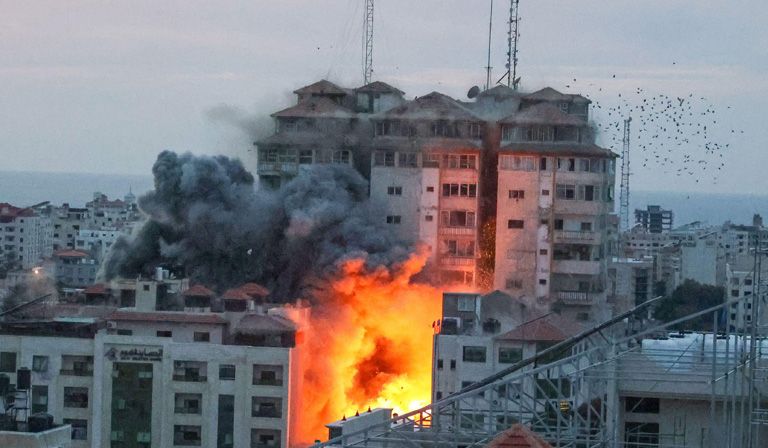The following words were written amid the storm of battle. Planes constantly circling in the sky, the bedroom turned into a shelter, the radio telling of new atrocities, the heart torn with fear as to the fate of missing persons. The days are now devoted to funerals and condolences, and the evenings to guarding our small community. I have participated in many demonstrations against the terrible folly of Benjamin Netanyahu, which found its outcome in the revenge and rage in Gaza on 7th October. Today, I try to be available for acts of support and solidarity with the victims on all sides. This beautiful land between the Jordan River and the Mediterranean Sea weeps bitterly, its two communities refusing to be comforted.
Gaza has always been there, and there was always an impressive wall around it. But in biblical mythology, Samson takes the gates of the Philistine city on his shoulders and ascends east, to the land of Judah. In our own time, the frontier was broken not by one man but by many. Palestinians broke through the Israeli wall and mercilessly slaughtered Jews. How did the Gaza Wall fall? History was echoing back, the directions reversed.
Slowly we have collected ourselves and formed an understanding. It turns out that the magnificent Israeli tree was rotten inside, and with the first significant push it fell with an enormous noise. Three hungry worms ate our tree: brutal capitalism; national arrogance, both political and military; and submission to religious and colonial fundamentalism. These toppled the Israeli tree on 7th October. The impact now reverberates all around us.
A severed contract
We had an Israeli contract. Every Israeli agreed to give everything he or she had, including life, to protect the special home we had built here. And the state, for its part, undertook to protect its citizens in every possible way. This is how an impressive system of social solidarity was built over the years, with the government responsible for health and welfare, quality education and social security. We had a magnificent socioeconomic safety net, and every citizen knew: when the worst happens, I have a country that will “be here for me”. That was until Benjamin Netanyahu brought an intensification of the capitalist, libertarian spirit—the evil of American conservatism—to our country.
The current walls around Gaza were erected to perpetuate Israeli indifference. To separate the hell of Gaza from the Israeli paradise. To erase the reality of “there” from the consciousness of Israelis “here”
For years under Netanyahu’s leadership, the Israeli government has maliciously eroded the principle of government responsibility, sacrificing the entire social system on the altar of privatisation. And the result was that when the day came, the state was not there for its citizens. The first clause of the Israeli contract was violated by the government. Citizens cried out for help, entire communities were slaughtered, families fled, and who wasn’t there? Netanyahu’s government. It was left to civil society to rise to the heights of courage and resilience—and it did.
For years, almost all of them Netanyahu’s years, right-wing Israel has refused to deal with the Palestinian reality in general and the existence of Gaza in particular. The current walls around Gaza were erected to perpetuate Israeli indifference. To separate the hell of Gaza from the Israeli paradise. To erase the reality of “there” from the consciousness of Israelis “here”.
Netanyahu sought to sideline Palestinians until their demands were removed from the Israeli agenda. For a while, it looked as though it was working. His embarrassing friend from Washington, President Trump, boasted that by moving its embassy to Jerusalem, the US had taken the contested city “off the table” in negotiations. The 2020 Abraham accords, designed to normalise relations between Israel and three Arab states, threw the Palestinians under the speeding bus. Further normalisation talks with Saudi Arabia similarly made every effort to circumvent the Palestinians. Netanyahu’s blinkered followers had a few moments of euphoria when their leader seemed to have succeeded in changing the paradigm, making peace with the most important countries in the region without paying them in Palestinian currency.
That is, until Hamas came and announced: we are here. On 7th October, the Israeli-Palestinian conflict returned to the centre of the Israeli agenda. Welcome to Israel-Palestine.
The God of zealotry
Netanyahu had almost tolerated Hamas in the past, preferring to do minor deals with them than to enter into a dignified arrangement with the last Palestinian peacemaker, Mahmoud Abbas, the 87-year-old leader of the Palestinian Authority which has administered parts of the West Bank since Oslo. Together with the moderate Palestinians in the West Bank, he should have pursued the establishment of a functioning Palestinian state. But such a state will only be possible at the price of ending the Israeli colonialist chapter, which must mean an end to building new settlements on occupied land. Netanyahu didn’t want that, because it would alienate the core of his political base. To retain his religious fundamentalist supporters in the West Bank, he sacrificed Israelis living near Gaza. He chose the occupied territories and the God of zealotry over his civic duty to all Israeli citizens.
The Hamas movement—religious and fundamentalist itself—has committed one of the most horrific crimes we have seen in recent years. But the person whose arrogance made this possible is Benjamin Netanyahu. He and no other.
This war symbolically set reality back to the time before the establishment of the state of Israel. The Palestinians succeeded for the first time in doing what none of the Arab armies had been able to do from 1948 onwards: reclaiming—temporarily—swathes of occupied land, expelling Israeli Jews from their homes and stunning the Israeli army.
And when the Israeli structures collapsed, the layers of Jewish trauma were exposed. The Holocaust and the pogroms returned to the centre of emotional discourse. And for decades to come, the age-old Jewish holiday Simchat Torah, which this year took place from 6th to 7th October, will also be a day of mourning and remembrance. Israel, established to ensure the safe existence of the Jewish people forever, has become the most dangerous place on earth for the Jewish people, both as individuals and as a collective.
This will endure as an “achievement” in the Palestinian consciousness, even though many members of the Palestinian people completely reject the crimes against humanity that led to it. Many of them now fear—and rightly so—a second Nakba, the mass displacement and dispossession of Palestinians in 1948 which has become an ongoing tragedy.
Where now?
One question remains: whether a new beginning for our two national communities will emerge from the rubble. The brutality will continue until some sort of settlement is reached. Its patrons will be the US and the European Union on the one hand, and the Arab countries that seek peace, stability and normalisation (including Egypt, Jordan, the United Arab Emirates and possibly Saudi Arabia) on the other. Hamas leaders who survive will be exiled to a third country. A non-Hamas Palestinian regime will be appointed to oversee the rebuilding of Gaza. Global capital and knowledge will flow into the reconstruction of both Gaza and Israel.
Inside Israel, elections will be held well ahead of schedule. Netanyahu will employ all the tricks left up his sleeve. He will dodge, lie, blame others and seek to rally the zealous loyalists that comprise his base, all to evade the verdict of the electorate and history. It won’t help him. He is, politically speaking, a dead man walking. A furious people will tear him and his movement down. His terrible legacy will be dragged through the streets like statues of Lenin and Stalin after the fall of communism, accompanied by shouts of “Shame! Shame!”
The government that is formed after him will have to address the national trauma. One possible response is a supercharged victimhood, in which we besiege ourselves by building even higher walls to shut out the true reality. In this future, we remake Israel as the new Masada, the ancient fortification overlooking the Dead Sea whose inhabitants committed mass suicide rather than to surrender to the Romans.
The other way is the democratic one. Commit to rehabilitating Israel from the damage caused by the two Netanyahu alliances, the covert propping up of Hamas and the overt alliance with Jewish religious zealots. The first project of the next government will be the renewal of Israeliness—that is, renewing the contract between Israelis and their state, prioritising those ordinary citizens who contribute to its defence, welfare and prosperity, while excluding religious zealots and fundamentalists from all possible governmental influence.
The new politics will consist of an all-Israeli (not all-Jewish) coalition, in which representatives of Arab society will be equal members. This coalition will free Israel’s choking throat from the stranglehold of the religious and settler establishments, dismantling any illegal outposts and ceasing to prioritise the settlements at the expense of Israeli society as a whole. Then will come the renewal of Israel’s welfare and social support systems. The perception of security will change so that brute force, technological arrogance and overconfident contempt for opponents will no longer be a part of it. And with the understanding that there is no security without peace, the time will come for a new political concept. Getting there will not be straightforward, and it may seem a long way away right now, but it is the only possible destination.
Every person between the Jordan River and the Mediterranean Sea has the right to the same rights
The demolition of the previous Israeli and Palestinian existence has been decades in the making. Rebuilding our existence will take less time. Whether done in cooperation with an independent Palestinian sovereign, whether we have one state shared by both political communities or a confederation of equality and mutual respect, the goal is clear: peace, dignity and security for all. This is based on a simple principle: every person and every collective between the Jordan River and the Mediterranean Sea has the right to the same rights. Such a future cannot be achieved by more violence, discrimination, mastery and occupation. For the project to succeed, new alliances must be formed. No more automatic ethnic nationalism, but some of us—Jews—and some of them—Palestinians—who are committed to these values, united together against the religious, illiberal undemocratic extremists seen on both sides.
For years I have written, along with others, that Israel’s ability to pay attention depends on the type of trauma it faces. We Israelis never do voluntarily on the first day what we are forced to do on the last day. But when faced with the aftermath of a terrible trauma—especially one that only a blind intoxication with power prevented us from foreseeing—we can ultimately do the right thing.
Thus, the peace treaty with Egypt after the 1973 Yom Kippur War, the Oslo accords after the first intifada, and many other examples. And since the trauma we now face is the greatest of them all, the disillusionment with the violence and the hatred will also be greater and vaster than we have known so far. And when that happens, we’ll be surprised by how many friends and partners we find around us, waiting for us to arrive. The Middle East doesn’t need Samson’s muscles, it needs prophetic peacemakers. The sooner they arrive, the better.














